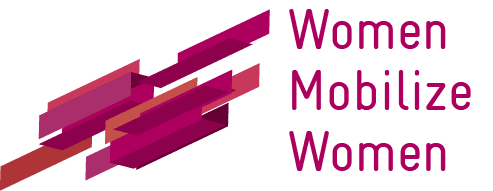After receiving such positive feedback last year, we feel delighted and honoured to publish the 2nd edition of Remarkable Women in Transport on International Women’s Day, March 8th 2020! This publication showcases the diversity of more than 50 female change makers in transport. As visibility is key to change mindsets, we are proud to present the work of these highly qualified transport experts. Just browse and get inspired!

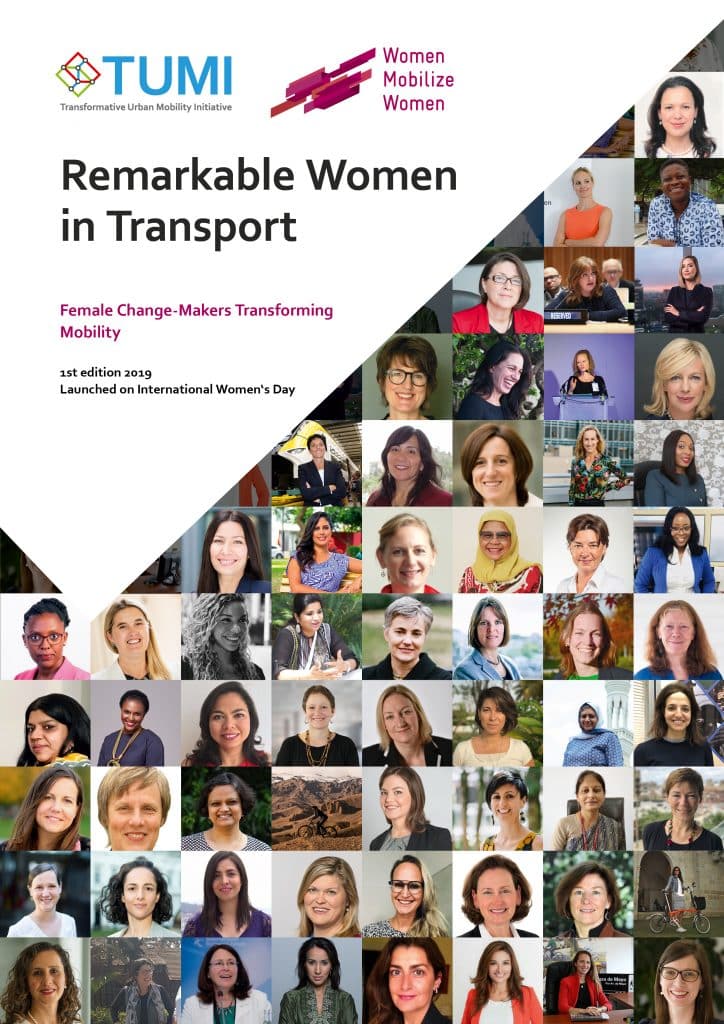
To make the daily work of women who transform urban mobility more visible, we are proud to present the first TUMI “Remarkable Women in Transport” Publication, presenting highly qualified women transport experts. The publication is available for download here.
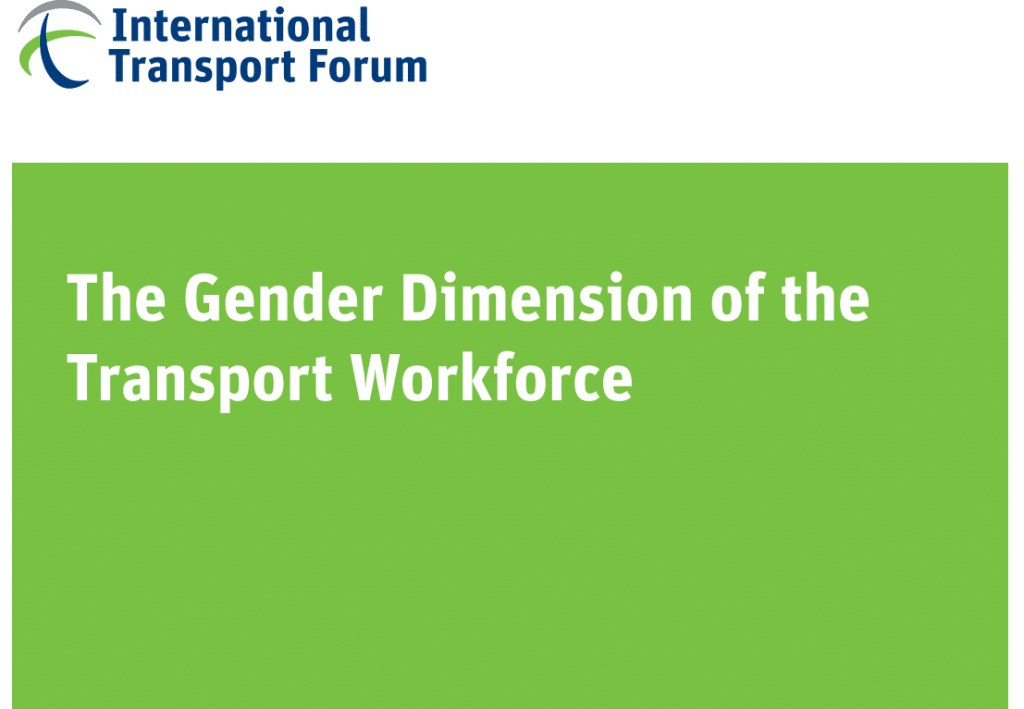
“In 2018, females represented less than 20% of the global transport workforce.”
The International Transport Forum published this discussion paper to draw attention to the current gender gaps within the transport workforce and demonstrate the benefits of increased female participation in the transport sector. It focusses on the different barriers women face when trying to enter the transport workforce, like the working conditions and gender stereotyping and analyzes the correlation between female participation in the transport labor force and socio-economic circumstances.

Counting women so that women count
Women represent around half the world’s adult population, yet the evidence base used to make most decisions about transport do not take their needs into account in a systematic way. The FIA Foundation commissioned this report to understand how gender is considered in transport data collection and ways to improve it for more inclusive policy development.

Safer Streets, Safer Cities in Bihar
The Urban Catalysts with Centre for Catalyzing Change have published Safer Streets, Safer Cities street design guidelines mainstreaming women’s access and mobility. The publication provides guidance on street network, elements, process and the constitution of street design cells. In addition to infrastructure standards, guidance is provided on information, awareness and human behavior messages in creating safer streets for women and girls. They are targeted towards road development agencies, Public Works Department, Urban Development and Housing Department, Municipal Corporations in Bihar, transportation practitioners and groups advocating for women’s mobility and safety.
Visit the Website of The Urban Catalysts!
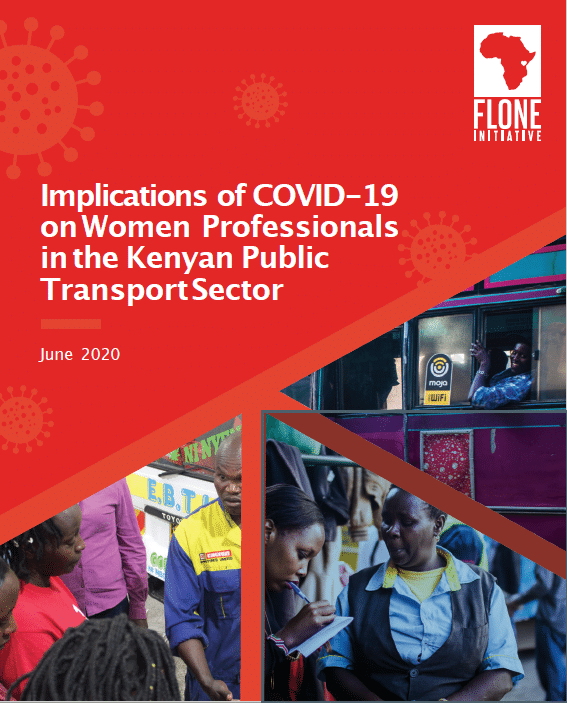
Implications of COVID-19 on Women Professionals in the Kenyan Public Transport Sector
The report by the Flone Initiatve elaborates on the impact of COVID-19 on women professionals in the Kenyan public transport sector, presents the mitigation strategies and makes recommendations for policymakers and other stakeholders to ensure sustainable public transportation systems during COVID-19.
For more information, please see the Flone Initiative Website.

The Relationship Between Gender and Transport
This publication written by Isabel Granada, Anne-Marie Urban, Andrea Monje Silva, Paola Ortiz, Daniel Pérez, Laureen Montez and Alejandra Caldo was published by the Inter-American Development Bank for Transport Week 2015 and explores why the aspect of gender is imortant in transport. It explains what challenges women have to face when using public transport and how men and women experience transport differently.

How to make inclusive mobility a reality: 8 principles and tools for a fair(er) transport system
The publication by INCLUSION presents recommendations on how to make mobility more inclusive, accessible and fair. Furthermore, it evaluates experiences, lessons learned, and viable business models, in order to improve the social dimension of sustainable transport.

Study on Security and Presence of Women in Public Transport
As part of an intersectoral and multilevel strategy to strengthen the security of users in all modalities of the ground transportation service of people in the national territory, the Ministry of Transport and Communications (MTC) developed this baseline study on gender and urban transport in Lima and Callao. Emphasis has been put on harassment against women, girls, boys and adolescents.

Wheels of Change: The Impact of Bicycles on Girls’ Education and Empowerment Outcomes in Zambia
The Wheels of Change are a randomized control trial conducted by Innovations for Poverty Action assessing the effectiveness of bicycles on girls’ education and empowerment in rural Zambia, with implications for scaling to reach millions of students across the developing regions of the world.
Bicycles are a cost effective and scalable solution to not only address the distance barrier to school, but also other broader empowerment and economic outcomes that enable communities to thrive. This is increasingly important as developing regions deal with COVID-19, and particularly the disproportionate impact on women and girls.
For more information, see the World Bicycle Relief: Wheels of Change Website.

Integrating Gender in Transport Operations
The Sustainable Infrastructure Advisory’s gender team by the International Finance Corporation (IFC) has developed a series of briefs focusing on gender & empowerment in different sectors. The brief on gender equity in transportation helps understanding the differentiated ways women and men benefit from, contribute to, and experience modes of transport. Gender-smart solutions, i.e. solutions that achieve overall business objectives of a client while closing relevant gender gaps in the process, present an opportunity for IFC and IFC clients to partner for better transport solutions.
For further information please see the CommDev Website on gender empowerment.

Gender Inclusive Climate Action in Cities
The C40 Inclusive Climate Action programme is designed to help ensure that responses to climate change are fair, that benefits are distributed equitably, and that climate action developed in cities is inclusive of, and accountable to, the diversity of urban populations. It is inspired by mayors and cutting-edge urban practice from around the world, giving mayors tailored support to deliver climate plans and actions that are inclusive of all communities (beyond those who are already aware and active), and to find equitable policy solutions. The programme supports mayors to deliver accessible, affordable and well-communicated services in transport, energy, waste and resilience. In doing so it helps
citizens to understand and experience the benefits of low-carbon transition.
For further information please see: Women4Climate Website.

Approaches for Gender Responsive Urban Transport
This Sourcebook gives an overview of the rationale of gender responsive urban transport. Get insights about the key issues to tackle: such as the support of women’s participation in decision-making, the improvement in accessibility, safety and comfort of transport modes and the planning of transport services in response to gender needs. A comprehensive checklist will help you, coming in very handy in the process of gender sensitive transport policy and planning.

Gender and Urban Transport
The third SUTP iNUA implementation guide focuses on gender as a cross-cutting issue that has to be considered in transport planning. The paper outlines the differences in needs and mobility patterns between women and men, and it offers concrete tools to include gender in an integrated transport planning for policy-makers, administrations and interested citizens.
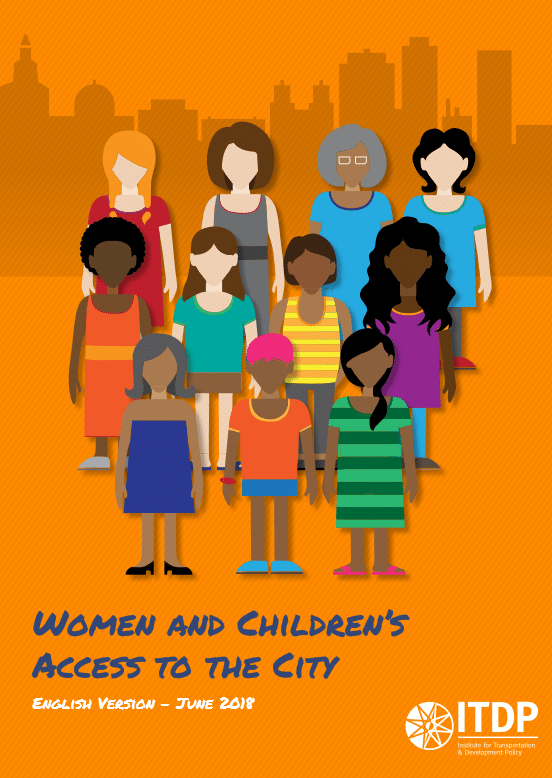
Women and Children’s access to the city
Women and children face greater challenges in accessing work, educational, and leisure opportunities offered in the cities. To shed light on this issue and formulate gender-sensitive indicators, ITDP Brazil focused on Recife, the capital of Pernambuco State, in northeastern Brazil, to develop Women and Children’s Access to the City. This report focuses on women, particularly those who are child caregivers, between the ages of 17 and 70, and live in low income areas.
For further information please see: ITDP Website

Women and Transport in Indian cities
This paper outlines the broad issues faced by women and girls when using or accessing urban transport, and recommends key measures to enable equitable access. The brief recommends gender responsive indicators, service level benchmarks and guidelines for comprehensive/green mobility plans as well as walking, cycling, public and intermediate public transport.
For further information please see: ITDP Website

Ella se mueve segura – She moves safely
The Ella Se Mueve Segura study, funded by FIA Foundation and CAF – Latin American Development Bank, explores women’s personal security on public transport in three cities; Quito, Ecuador; Buenos Aires, Argentina; and Santiago, Chile.

Safe and Sound
Safe and sustainable mobility is a vital part of empowering women, and plays an important role in achieving wider social and economic development. The report explores the implications of inadequate personal security on public transport, and reviews a large number of published international papers, reports and news articles, to scope the extent of harassment and identify potential responses. The report is the first stage of a larger study which aims to develop international guidance and principles for policy and decision-makers, transport/transit operators and other service providers; recommendations to help civil society and women’s groups. The report was sponsored by FIA Foundation, and written by Heather Allen, an independent consultant.
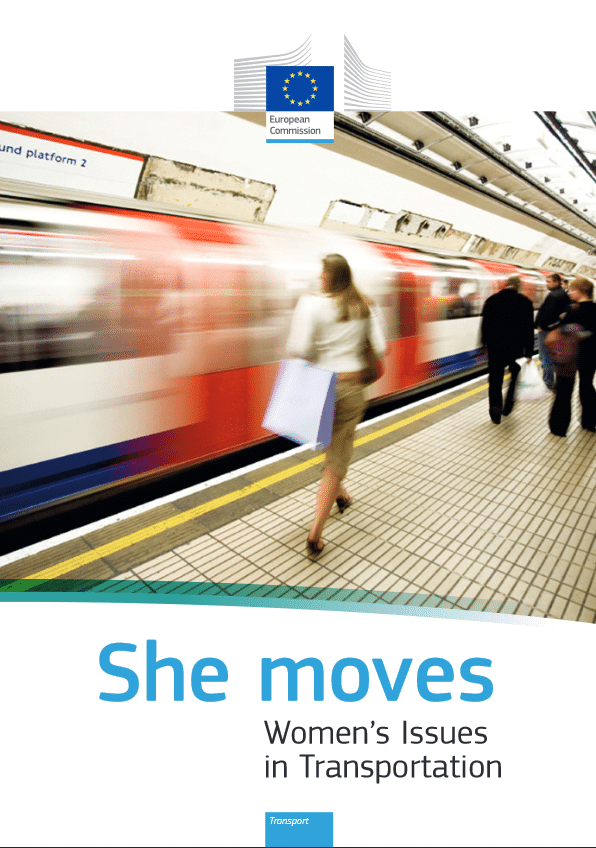
She moves – Women’s Issues in Transportation
The issues at stake in enhancing women’s mobility and making transport more gender neutral are addressed in this publication. Many of these issues have been extensively researched, but still receive limited attention in developing gender-specific policies, programmes, and mandates. Methods to translate gender research findings into policy need to be explored. In this respect, the gender impact of transport policies needs to be regularly assessed in monitoring their contribution to a gender-neutral transport system. As the concept of gender-neutral transport varies significantly in place and time with respect to values, needs, choices, constraints, and impacts, genderneutral transport needs to be addressed through international collaboration.

Gender Tool Kit: Transport
The purpose of the tool kit is to assist staff and consultants of the Asian Development Bank (ADB) and government partner executing agencies to conceptualize and design gender-responsive projects in the transport sector. ADB’s Policy on Gender and Development adapts gender mainstreaming across all sectors to promote and support gender equality and women’s empowerment.
For further information please see: ADB Website

Action on Equality: TfL’s commitments to 2020
This paper describes Transport for London’s (TfL’s) vision and policy on equality and inclusion from 2016-20. It builds on the latest research of the TfL and is a result of significant engagement the transport authority has undertaken with colleagues and a wide range of interest groups. Action on Equality extends the work of the Single Equality Scheme for 2012-15.
Please find further information here: Transport for London Website

Gender Mainstreaming in Urban Planning and Urban Development
In the field of gender planning, Vienna is accorded a top position at the European level with regard to both the conceptual depth and thematic width of its activities. This is also evidenced by the great international interest in the experience “made in Vienna”. The present manual constitutes a valuable tool for efficient quality assurance by planners that should be made intensive use of as the challenges faced by urban planning are growing day by day.
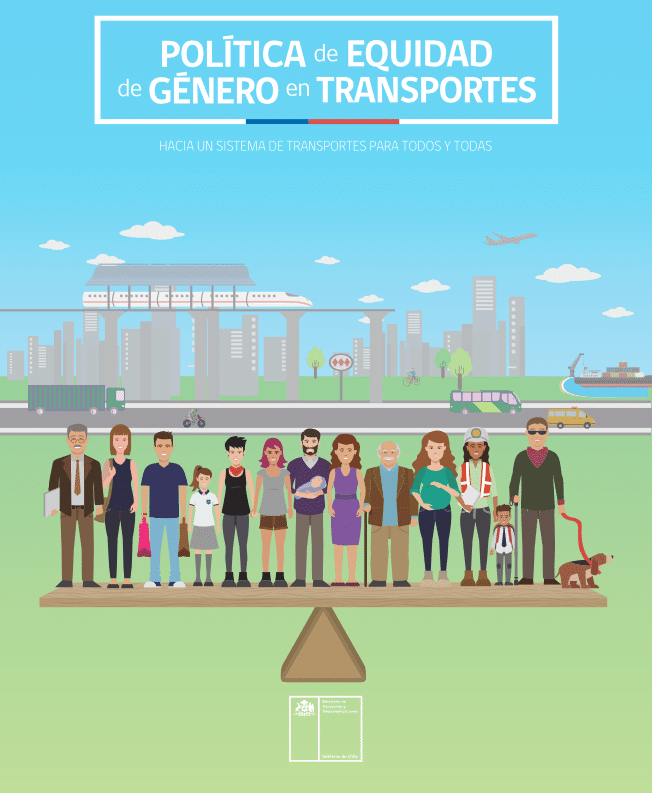
Política de Equidad de Género en Transportes – Gender Politics in Transport
This document gives an account of the process of construction of the Gender Equity Policy in Transport, the main problems in the matter, its link with the mission and institutional vision, as well as its objectives and lines of action, pointing not only to equal opportunities, but also mainly to substantive equality and justice of gender.
For further information in Spanish: Website
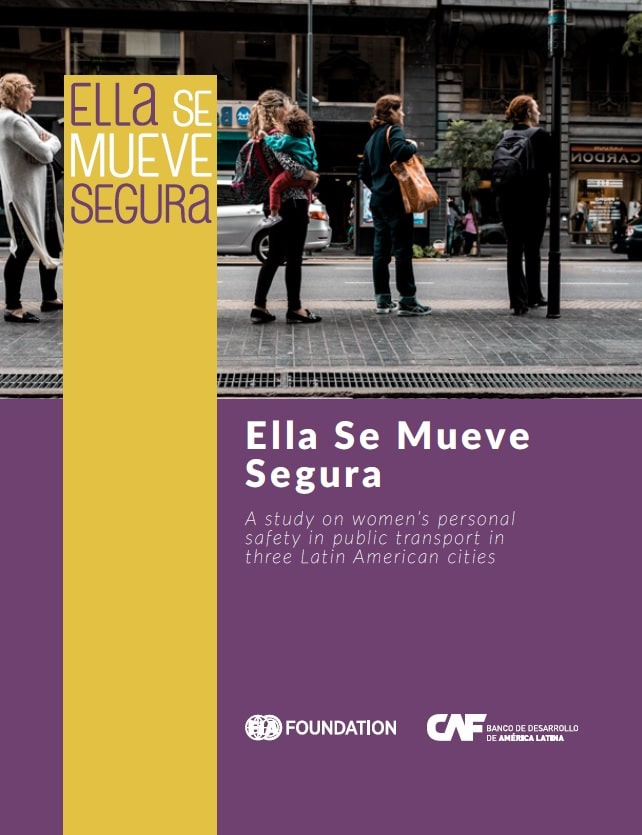
Ella Se Mueve Segura – A study on women’s personal safety in public transport in three Latin American cities
Gender inequality is not only a pressing moral and social issue but also a critical economic challenge. When women – who account for half the world’s working-age population – do not achieve their full economic potential, regional economic development suffers. Providing safe and equitable access to education and employment is not only a basic human right, it is also part of national commitments to the Sustainable Development Goals and the New Urban Agenda. This report and the accompanying toolkit are the result of a study in three Latin American cities on women’s concerns about their personal security while using public transport.
Please find further information here: Fia Foundation Website

Women’s Safety and Security
A Public Transport Priority
This compendium assembles voices from the transport sector on the critical issue of safety for women in public transport and transport more generally. Surveys show that most women who use public transport feel exposed to physical or verbal aggression, sexual harassment and other forms of violence or unwelcome behavior, leading to personal stress and physical harm. As women rely on public transport for access to employment, education and other public services, making it hard for them to be mobile also reinforces inequality.

Understanding Urban Travel Behaviour by Gender for Efficient and Equitable Transport Policies
Gender is one of the key socio-demographic variables that can influence travel behaviour, but it is often the least understood. Understanding travel behaviour by gender will help better design transport policies that are efficient and equitable. Due to the gendered division of work in households, women often have multiple tasks and activities. As a result, women are more likely to have shorter commute distances, to chain trips, to have more non-work related trips, to travel at off-peak hours, and to choose more flexible modes. This study examines travel behaviour by gender in eight different cities, across three different continents, focusing on transport mode, trip purpose, travel distance and departure time for Auckland, Dublin, Hanoi, Helsinki, Jakarta, Kuala Lumpur, Lisbon and Manila. The most common trends found in the cities are that women tend to travel shorter distances and prefer public transport and taxi services to cars more than men.

Transport Connectivity – A Gender Perspective
The 19 contributions in this compendium highlight how better transport connections improve access to opportunities for women and girls. Easy physical access to schools and universities, to workplaces, health services and other opportunities is a powerful force for social inclusion and economic development. The authors present challenges and shortcomings of transport connectivity from a gender perspective and propose solutions that will contribute to more inclusive and sustainable transport for all.
Become Part and Design with us a new Movement!
Are you a transport woman expert who mobilizes or are you interested to join us in mobilizing women in transport? Design with us the Women Mobilize Movement and get in contact with us to mobilize women together!
